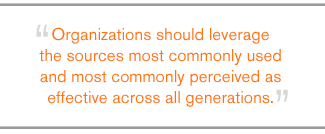Employers continue to adopt new and innovative ways to find the right people to join their organizations. Job openings that used to grace the black and white pages of the local newspaper now reach any number of interested individuals via the Internet. And as the number of Web-based job search tools continues to grow, so does the ability of organizations to track applicant traffic, interest, and behavior in more detail.
 |
In a May 2008 survey, we asked a targeted sample of job seekers whether or not they used each of 19 different resources during their most recent employment search. We also reviewed the job seekers' self-reported effectiveness of each search tool. (See "Job Seekers: Personal Connections Still Matter" in the "See Also" area on this page.) We found that when job seekers are looking for employment, their use of media varies by age.
Use of Web-based resources varies by generation
How do respondents in each of three generational definitions -- Generation Y (ages 18 to 31), Generation X (ages 32 to 42), and Baby Boomers (ages 43 to 61) -- rate their use and the overall effectiveness of nearly two dozen types of employment search resources? Generally, personal connections and referrals still lead the way among job seekers regardless of generation. But there are notable generational differences when comparing use and proclaimed effectiveness of some Web-based resources such as search engines, professional or trade association Web sites, and other online networking tools.
Web-based job search resources are bountiful, but job seekers' self-reported behaviors and opinions represent how useful potential employees consider the different online alternatives. A majority of Generation Y, Generation X, and Baby Boomer job seekers say they used online job databases and organizations' individual Web sites during their most recent employment search. But while about 60% of each generational group say they used the individual Web sites, those in Generation Y -- despite being the youngest and presumably the most technically savvy -- are least likely among the three generational groups to say they used these sites.
Additionally, job seekers in Generation Y are less likely than those in Generation X and Baby Boomers to say they used any of the other online tools listed in the survey, including search engines, professional or trade association Web sites, online networking tools, online job advertisements, and blogs. Conversely, job seekers in Generation X were more likely than those in Generation Y and Baby Boomers to have used online job databases. In fact, at 76%, Generation X job seekers are as likely to say they used these Web-based databases as they are to say that they relied on friends and family the last time they looked for work (77%).
While Generation Y job seekers might be less likely than older respondents to use online tools other than company Web sites, and Generation X seekers might be more likely than other age groups to use online job databases, job seekers overall rate the effectiveness of these and other Web-based job search resources similarly, regardless of generation. One implication of this finding is that using the Web to recruit is likely to increase the pool of mid-career hires, a critical group for companies looking for experienced employees.
Relationships and real experiences still key across age groups
As reported in the May 2008 article, job seekers are most likely to say they used friends and family and referrals from current employees of organizations during their last employment search. Two-thirds of job seekers also said they used their own experience with or perceptions of a company when looking for work. These three types of job search resources rank among the top of the list for those in Generation Y, Generation X, and Baby Boomers.
Specifically, members of Generation Y are most likely to cite friends and family, then employee referrals and their own experiences. Generation X job seekers also mentioned friends and family most frequently and cited referrals and past experiences frequently. Baby Boomers followed suit, saying they used past experiences, referrals, and friends and family about equally.
Not surprisingly, then, job seekers are most likely to rate referrals, friends and family, and past experiences as the most effective channels, in that order. In addition to the assumed reliance on the opinions and recommendations of friends and family, the ability to control part of the application process might be one reason for job seekers' preference for personal connections versus some of the other online options.
 |
"The initial résumé screening process is so impersonal now," said one 28-year-old job seeker when asked about frustrations during the most recent job search. "It is difficult to try and get my foot in the door when I have to send an e-mail to jobs@whatevercompany.com. It is hard to cut through the clutter and the barriers set up to screen people out."
Accurate understanding of best performers
The number of drastic dissimilarities between different generational groups is small when comparing job seekers' overall use and reported effectiveness of job search resources. One notable exception exists, however. Respondents in Generation Y are more likely than those in Generation X and Baby Boomers to say they used their college career center or Web site -- as well as their alumni network -- during their most recent search for employment.
Additionally, Generation Y respondents are more likely than those in Generation X and Baby Boomers to rate these college and alumni resources as effective tools for their last job search. Not surprisingly, those who have graduated more recently are most likely to use a college's career center or alumni network to find a job.
So, what if an organization wants to hire recent college graduates with business degrees? Focusing part of its recruiting resources on college and alumni career centers and networks would seem to pay off to some extent. However, even though Generation Y job seekers are more likely than the other two groups to say they use and rate these resources as effective, they are still far more likely to use and rate resources such as employee referrals and other personal connections as effective. Organizations should leverage the sources most commonly used and most commonly perceived as effective across all generations -- sources that connect applicants to the employees and customers.
Despite a couple of exceptions, there are more similarities than differences by generation in job search resource usage and effectiveness. This makes it problematic for organizations to develop recruiting strategies that target specific generations of job seekers.
As a better alternative, organizations should spend the time and resources to research and learn as much as possible about the behaviors and thoughts of their best performers and most talented applicants in each role. An accurate understanding of what channels and tools prospective "right fit" employees use and find most effective allows organizations to maximize their recruiting strategies to attract more talented applicants. This way, organizations can capitalize on any of the evolving types of job search resources and tools.
Results are based on an online survey conducted with a targeted U.S. sample of 1,376 adults aged 18 and over who were seeking a job. The data were collected between August 28 and September 16, 2007. To participate in this survey, participants had to be looking for a full-time or part-time job within the past six months. For results based on the total sample, one can say with 95% confidence that the maximum margin of sampling error is ±2.7 percentage points.